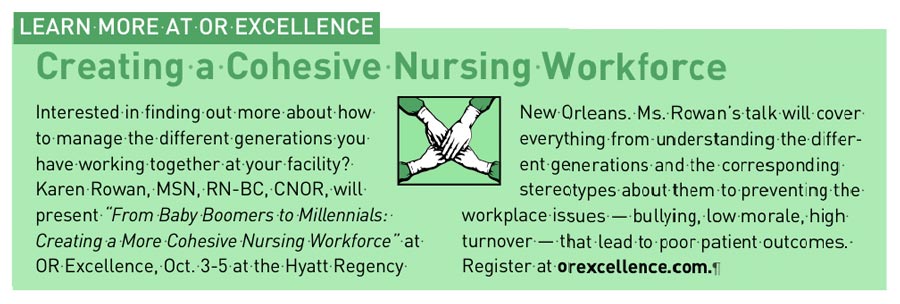Six Surface Disinfection Concepts
The puzzle of superior surface disinfection is never solved....
This website uses cookies. to enhance your browsing experience, serve personalized ads or content, and analyze our traffic. By clicking “Accept & Close”, you consent to our use of cookies. Read our Privacy Policy to learn more.
By: Karen Rowan
Published: 8/12/2019
Millennials are lazy, entitled narcissists. Baby Boomers are tech-illiterate dinosaurs too set in their ways to learn anything new. These tired stereotypes are not only patently false, they're also dangerous — especially in the stress-filled surgical arena where several generations of nurses and other skilled staff must work side by side. Here's how to ensure generational differences don't derail the productivity, morale and even retention rates at your facility.
1 Recognize the differences. As a surgical facility leader who oversees 2, 3 or sometimes even 4 (Baby Boomers, Generation X, Millennials and Generation Z) generations, it's up to you to understand what makes each group tick.
2Separate, then educate. When staff don't understand these generational differences, misunderstandings and resentments run rampant. Case in point: At my facility, some of the older, more experienced nurses couldn't understand why so many of the younger RNs refused overtime shifts. Until I reminded them, the older nurses didn't appreciate how important work-life balance is to Millennials. "Wow, I never thought of that," a Baby Boomer remarked. "I thought So-and-So was just lazy because she never wanted to work overtime." To prevent similar misunderstandings, we held workshops that broke our team into 2 groups: novice nurses and experienced nurses.

With novice nurses, the goal of the workshop should be to make them feel comfortable, voice some of their frustrations and prepare them for difficult situations they may face or conversations they'll likely have in the OR. I do this through role-playing sessions, where 2 people will act out a workplace scenario with one person being the aggressor and the other being the reactor. I find real-life stories, examples and scenarios work best; the more detail, the better. I base the scenarios on actual occurrences, such as the older nurse who purposely broke equipment so that when the new hire went to use it, it wouldn't work and the doctor would yell at her; or the vindictive nurse who gave the young nurse the wrong directions to locate the instrument tray.
With your veteran staff, it's more about raising awareness — something that's especially important if you've recently added younger, more inexperienced staff or if your facility has some type of fellowship program for new RNs. Experienced nurses tend to forget what it's like when you're just starting out in the OR. This is an opportunity to remind them and to highlight common generation differences.
3Provide practical tools. For more experienced staff, education is often the best way to describe generational differences. For your younger, more inexperienced staff, however, you may have to take it a step further. After my education sessions with novice nurses, I do a debrief on what happened during those role-playing scenarios. Then, we go over some de-escalation techniques they can use during difficult situations. It's all about giving these nurses practical tools they can use. One of these tools is a script on how to own their feelings and address situations head-on with very specific language.
If a newer nurse feels like an older nurse is being hard on her to the point of bullying, then she needs to have a difficult conversation. That means finding the right time (not in the middle of a busy case!) and saying, "I feel like we're not in agreement here, and I feel that you don't like working with me. What can I do to make it better?" More often than not, if you confront a bully, she will stop her bullying. At the same time, it's important for newer nurses to understand the problem might not be personal. With all the turnover facilities face among younger nurses, preceptors and educators can get burned out — especially at hospitals and surgical centers that are actively trying to backfill for the departure of retiring nurses.
In the end, if you can get different generations to understand each other, they're much more likely to work together as a team. OSM
The puzzle of superior surface disinfection is never solved....
Boston Children’s Hospital is renowned for its exemplary care on many fronts, including surgery....
Manual cleaning done properly is effective for eradicating microorganisms....